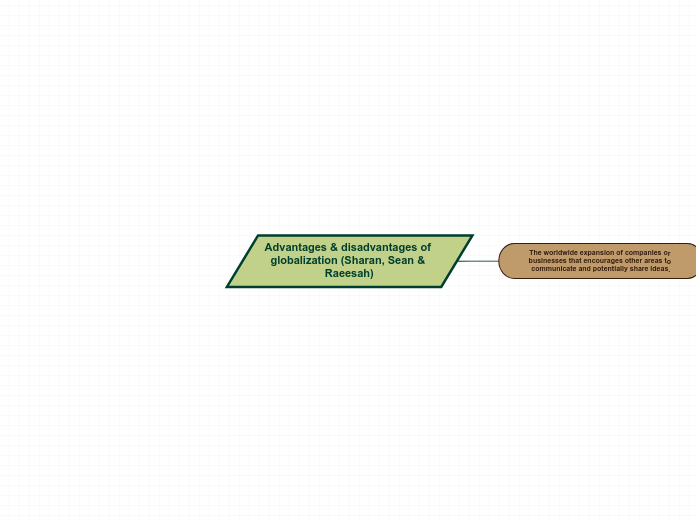Advantages & disadvantages of globalization (Sharan, Sean & Raeesah)
The worldwide expansion of companies or businesses that encourages other areas to communicate and potentially share ideas.
Advantages
5. Creates opportunities for countries to aid other countries that do not have the same resources as them
As grateful as we are living in a country like Canada, some other countries do not have the same opportunities as us. Countries like Canada can help other countries with problems they are facing such as unemployment, diseases, and natural disasters. Globalization allows for countries that have the resources to help other countries around the world that don’t have those same opportunities. This can be sending people help with a flood, or opening work so people in other countries are employed and can provide for themselves and their families.
Ex. We all know about the very devastating wildfire in Australia that took place this past January. About 100 Canadian fire experts were sent to aid in putting the fire out.
2019-20 Australian wildfire
4. Lower manufacturing cost
Allows large companies to take advantage of Chinese manufactures or other low cost manufacturers world wide. It can also help not only large businesses who would like to save on manufacturing costs but also small businesses save money due to how much cheaper it is to manufacture in other countries besides their own.
Ex. China is one of Canada’s largest merchandising trading partners. Some large companies in Canada manufacture their goods in China due to China having a cheaper manufacturing cost. This not only benefits the company but also the country that Canada for example is using. The manufacturing sector in China contributed to 40% of China's GDP in 2015.
Numerous factory workers in China working hard to produce goods.
3. Increases cultural awareness
Every country is unique and special in their own way. They all have their own wow factors if you must. Globalization allows for the citizens in different countries to not only be exposed to but appreciate other cultures. It gives them the opportunity to see, interact, as well as appreciate the diversity we have around the world. It allows for us as humans to understand each other better and live in a world with peace and harmony where everyone feels accepted for who they are all around the world.
Ex. One of the largest fast food companies in the world is McDonald’s. When McDonald’s opened in India. They had to change their menu by adding more vegetarian options. This is because a lot of people in India are vegetarians due to cultural reasons. McDonalds being a large fast food restaurant had to adapt to the culture and beliefs that the majority of their customers followed to be a successful business in India.
McDonald's Indian menu.
2. Newly invented technology spreads faster to other countries
Technology is always advancing all around the world. By using technology in one country it allows for second or third world countries to discover that same technology and use it to their benefit. This helps those countries develop and gives them access to newer technology much faster. This has huge benefits on not only the economy but also the citizens of that particular country.
Ex. Banking is something everyone does all around the world. In Kenya however, if someone wished to send money they would have to put it in an envelope and trust someone to deliver it to the recipient. Now only 1% of people in Kenya have a landline and more than 70% have access to a cell phone. This allows for mobile banking to take place in Kenya using an app called M-pesa (pesa meaning money is Swahili).
The map of Africa next to a smartphone.
1. Broadens access to goods and services
With improved technology and trade it has allowed countries around the world to import and export goods that aren’t available there from one country to another. This not only benefits one, but it benefits both countries taking part in the trade. Both countries are gaining either some type of good or service. Not to mention, it also benefits the citizens of that particular country because of the type of good or service that is being exchanged or traded.
Ex. As you may know Canada and the USA are very good trade partners. In 2018 the USA exported a total of $24 billion worth of agricultural products to Canada. The USA’s total exports of services to Canada was about $64.1 billion.
An cartoon of USA and Canada working together back and forth.
Disadvantages
5. Destruction of the environment
The increased demand for goods and services pose a massive threat to earth’s resources. In order for companies to financially gain, they have to produce huge amounts of carbon dioxide, deforest areas and harm wildlife. To add, this is occurring at a rapid pace where the environment cannot compensate or regenerate.
Ex. Deforestation contributes to 20 percentage of the greenhouse gases produced. The main reason it occurs is companies need land to construct factories and plants which often produce carbon dioxide as well. For instance, Brazil was rich in forests 10 years ago, but due to the need for land it lost a great deal of its trees.
A forest that was destroyed in the Democratic Republic of the Congo due to deforestation.
4.Giving international companies authority over you
In the past, businesses planning to expand worldwide had to follow countless laws and regulations. Nowadays due to the high economic gain, countries have loosened their rules to encourage more international companies to come. Not only does this portray leniency and inferiority by telling corporations you will listen to their rules. Additionally, they are expanding and conquering the world’s market; more money in companies pockets, more power they have.
Ex. The richest bank in the world is The Industrial and Commercial Bank of China. They also own China Construction Bank Corporation and Japan Post Bank. Their combined assets are greater than 7 trillion dollars USD. Also, they have 108 branches worldwide which equates to having control over all those different region’s money as banks are government institutions.
A physical ICBC location in Asia.
3. Disregard for human decency
Laws and rules differ from region to region. Whether it be a child being forced into unsafe labour in Indonesia, instead of an adult working in a regulated facility in Canada.The priority of companies manufacturing internationally are producing quick and inexpensive goods, as opposed to human rights. Since, human power is priced significantly lower and readily available in countries around the world, globalization will continue to occur.
Ex. Bangladesh’s booming leather industry exports 1/10th of the global leather market. However, to keep up with the worldwide demand they comprise safety and regulations. For instance, Justin Kenny and Larry C. Price from PBS NewsHour traveled to numerous tanneries and witnessed many labourers without the proper safety gear and protection from the lethal chemicals being used.
Inside a leather tannery in Dhaka, Bangladesh.
2. Lessening diversity/multiculturalism
Globalization and Westernization go hand and hand. Western ideologies are more favourable and preferable. As the West is encouraging their government style, entertainment and lifestyles choices, other regions of the world are losing their unique cultural beliefs. For that reason, countries are losing their individualism and becoming carbon copies.
Ex. Fast food is becoming a staple food outside of North America as never seen before. In particular, McDonald’s has seen large economic growth worldwide. With that, individuals globally are changing their diet to more Americanized cuisine, such as hamburgers and fries.
Outside a standard McDonalds restaurant.
1. Danger of job loss in origin countries
When companies globalize they often employ people from developing countries. While that brings money into those countries by taxes and fees, it removes potential jobs in the company’s home country. As globalization occurs on such a large scale, many jobs will be lost and impose a new threat to the developed economy.
Ex. China is known for its rapidly expanding economy. In 2017, over 130,000 companies from overseas were producing goods in China. Certainly, this provided China with various benefits such as a low unemployment rate, high GDP growth rate and gross national income. However, if the majority of jobs are concentrated in one area it does not allow other areas to grow equally.
Inside a Chinese toy manufacturing company with thousands of workers.









